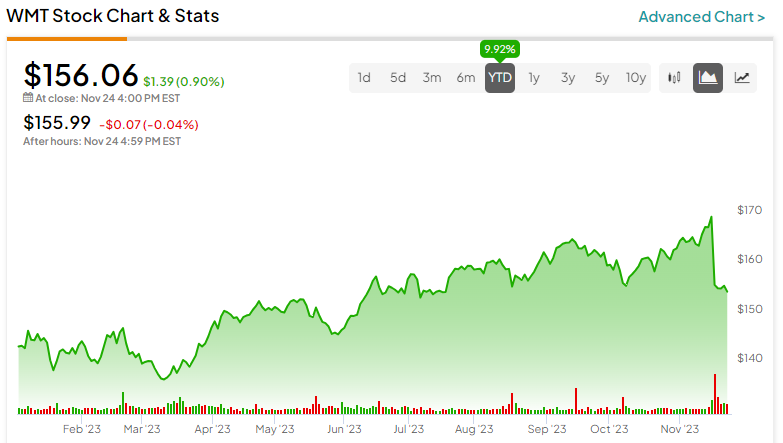Global retail giant Walmart’s (NASDAQ:WMT) vast market presence and smart growth strategies have been the cornerstone of its success story so far. A challenging macro environment this year couldn’t dent its business, as witnessed by its recent robust Q3 Fiscal 2024 results. Shares are up 10% YTD, compared to the S&P 500’s (SPX) gain of 20%. Its consistent dividend hikes over the last 50 years signify its ability to keep its business stable, making me bullish on WMT now.
Discover the Best Stocks and Maximize Your Portfolio:
- See what stocks are receiving strong buy ratings from top-rated analysts.
- Filter, analyze, and streamline your search for investment opportunities with TipRanks’ Stock Screener.

A Good Quarter amid Challenging Conditions
What started as a single discount store has expanded into a vast network of hypermarkets, supermarkets, and membership-only warehouse clubs. Walmart now operates roughly 10,500 stores and clubs in 19 countries worldwide. Its size is Walmart’s competitive advantage, which is putting many small stores out of business.
Furthermore, its “Everyday Low Price” strategy has been successful in attracting customers, particularly during a period of rising inflation. In the third quarter of Fiscal 2024, total revenue grew 5.2% to $161 billion, driven by strong demand across all its segments.
Walmart’s U.S. comparable store sales jumped 4.9%, while e-commerce sales rose by 24% in the quarter. Its Mexican and Central American division (Walmex), along with China, drove its International sales up 11% to $28 billion. Adjusted earnings per share (EPS) also increased by 2% to $1.53. Both revenue and earnings exceeded consensus estimates.
CEO Doug McMillon commented on the third-quarter results, saying, “We had strong revenue growth across segments for the quarter, and we’re excited to get an early start to the holiday season.”
Walmart ended the quarter with cash and cash equivalents of $12.2 billion and total debt of $55.4 billion. While the debt appears enormous, Walmart’s interest coverage ratio as of October 2023 is 9.09. It is calculated by dividing a company’s operating income by its interest expense.
This ratio indicates how convenient it is for the company to pay interest on its outstanding debt. A high ratio, such as WMT’s, indicates sturdy financial health.
Added Perk: A Dividend King
The added perk of picking Walmart as an investment is that it is a dividend stock — and not just any dividend stock. By increasing dividends for more than 50 consecutive years now, the retail giant has now graduated from a Dividend Aristocrat to a Dividend King. It offers a dividend yield of 1.46%. However, this is lower than the consumer sector average of 2.1%.
While the dividend yield isn’t that attractive, consistency in dividend payments matters more when choosing dividend stocks. Additionally, it has a dividend payout ratio of 34.6%, meaning investors can expect sustainable dividends, going forward. This ratio determines how much of its net earnings are paid out as dividends.
Although Walmart is not a fast-growing tech stock, it is the world’s largest retailer, boasting massive customer loyalty. Despite the challenging economic conditions, Walmart has consistently generated earnings and free cash flow (FCF), allowing it to boost shareholder returns in the form of dividends.
For the nine months ended October 31, it generated FCF of $4.3 billion, a $0.7 billion increase over the same period a year ago. Positive FCF should permit settling debts, paying dividends, and funding future expansions.
The Road Ahead for the Retail Giant
Walmart has also expanded its supply chain capabilities by collaborating with Symbotic (NASDAQ:SYM), an AI-powered robotic and software platform. In 2022, both companies agreed to install Symbotic systems in all 42 of Walmart’s distribution centers across the U.S.
The entire automation process in 42 centers could take more than eight years to complete. However, it will help Walmart simplify its supply chain process, reduce costs, and boost margins in the near term. Moreover, according to CNBC, Walmart is not only a partner but also an investor, with an 11% stake in Symbotic.
Driven by a strong third quarter and the holiday season in full swing, Walmart increased its Fiscal 2024 full-year guidance. It now expects sales to increase by 5% to 5.5% year-over-year. That would bring full-year revenue in the range of $636 billion to $639 billion.
Furthermore, Flipkart’s Big Billion Days in India, which happened to fall in Q4 of Fiscal 2024, could aid in further growth in international sales. For the Fiscal Year, EPS is expected to come in between $6.40 and $6.48. Meanwhile, analysts’ forecasts for Fiscal 2024 are slightly higher than management’s, with expected EPS of $6.49 on revenue of $642 billion.
Talking about the near-term future, management stated, “Over the next several years, we expect margins to move higher, as we modernize our supply chain and scale higher-margin growth initiatives.”
Is WMT Stock a Buy, According to Analysts?
After its Q3 earnings, Roth MKM analyst Bill Kirk maintained his Buy rating on the stock, with a price target of $179. The analysts believe Walmart will continue increasing its market share and profitability. He added, “Near-term volatility aside, we believe Walmart is on the precipice of a major inflection.”
Additionally, HSBC analyst Daniela Bretthauer also reiterated her Buy rating on the stock, with a price target of $200. The analyst is impressed with Walmart’s efforts to renovate its stores and grow e-commerce sales and is positive about the updated Fiscal 2024 guidance.
Over the past three months, 25 out of 30 analysts covering WMT stock rate it a Buy, while five rate it a Hold. There are no Sell recommendations for this consumer stock. The average Walmart stock price target is $180.79, implying upside potential of 15.9% over the next 12 months.

The Bottom Line on Walmart Stock
Walmart’s journey from a small-town retailer to a global powerhouse has left an unforgettable imprint on the retail industry. Its investments in online platforms and digital infrastructure reflect its commitment to staying relevant in an ever-evolving market.
Earning the Dividend King title in the highly competitive consumer sector represents Walmart’s ability to maintain stable earnings amid economic volatility. It also depicts its commitment to return money to shareholders. This business strength has most likely contributed to its stock gaining about 137% in the last 10 years.
Therefore, I believe that no matter the competition, it will be difficult to shake up Walmart’s dominance. The company is likely to keep expanding its revenue and profits, thus retaining its Dividend King title.









